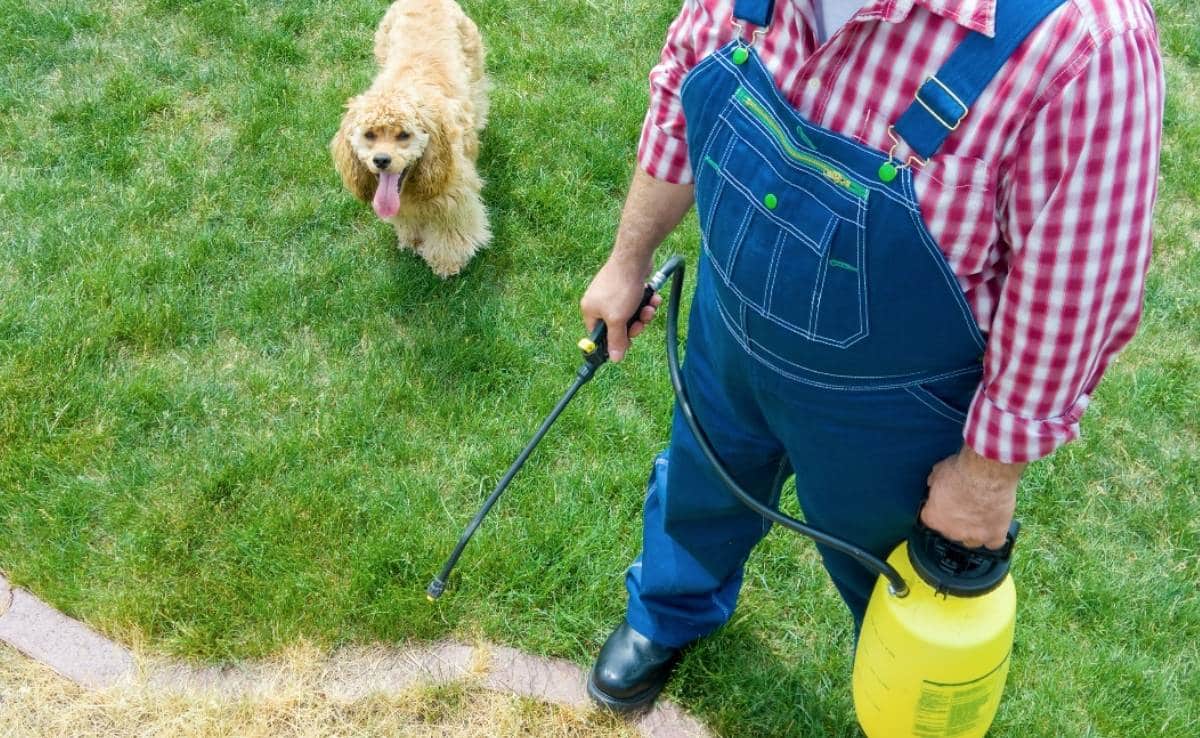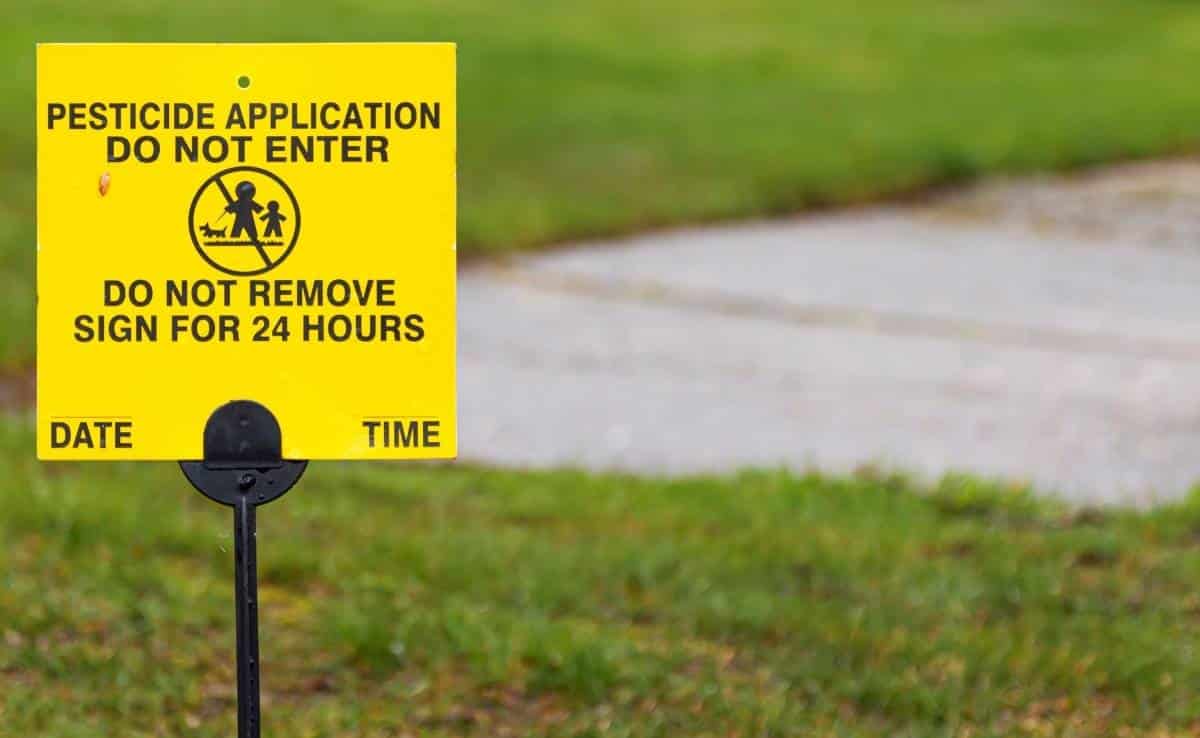Is Roundup Safe For Dogs? Should You Use This Popular Weed Killer On Your Lawn?
When you purchase through links on our site, we may earn a commission. Here’s how it works.

It’s so challenging as a pet parent to know which household cleaning and lawn-care products are safe to use around our pups. When it comes to lawn and garden care, the health risks for your pets can be quite high and even lethal, depending on the products you use. Millions of homeowners and commercial farms use Roundup and other products containing glyphosate. But is Roundup safe for dogs? I’ll share the suspected and known health risks, what experts have to say, scientific studies, and much more.
Table of Contents
What Is Roundup?
Roundup is a weed killer widely used by homeowners, commercial farmers, public parks, schools, and many other places. Its key ingredient, glyphosate, is a non-selective herbicide, meaning that it kills nearly all plants rather than specific species. Glyphosate prevents plants from making the proteins needed for growth. Roundup also contains other undisclosed inactive ingredients.
Is Roundup Toxic To Dogs?
Roundup’s primary ingredient, glyphosate, is generally considered harmful to dogs if ingested or with external contact when it’s still wet (for short-term toxicity). However, major animal welfare organizations and professional veterinary associations in the U.S. haven’t taken a stance on Roundup or glyphosate as toxic for pets.
The U.S. Environmental Protection Agency’s (EPA) most recent assessment of glyphosate in 2020 doesn’t address companion animals and even goes so far as to say that glyphosate doesn’t pose health risks for humans from its current use (more on that later). However, the EPA does say it identified potential ecological risks to mammals and birds and further stated, “These risks are expected to be limited to the application area or areas near the application area.” Despite no data included, this statement alone suggests that pet parents should avoid using Roundup (and other weed killers containing glyphosate) in areas where their pets spend time.
Is Roundup toxic once it’s dry? According to Roundup’s website, “people and pets may enter the treated area after the spray has dried.” However, independent research hasn’t conclusively shown that glyphosate, when dried in your yard, is safe for pets.
How Toxic Is Roundup To Dogs?
Two separate studies of animal poison control centers in the United Kingdom and France found that the most common symptoms of glyphosate ingestion included:
- Vomiting
- Diarrhea
- Labored breathing
- Lethargy
- Hypersalivation (excessive drooling)
The U.K. poison center also reported pulmonary edema (fluid in the lungs) in five out of 992 dogs and two dogs that required euthanasia. These studies only focused on short-term symptoms of exposure to glyphosate. It’s also important to note that cats suffer more serious symptoms.
What About Long-Term Health Effects?
If you’ve kept up with the news over the last few years, you’ve likely seen coverage about the numerous lawsuits filed with Bayer, the current manufacturer of Roundup, claiming that their product is responsible for causing cancer in humans. Much of the litigation is still ongoing, but some plaintiffs have won their cases against Bayer (and some have lost).
The unfortunate reality is that even experts aren’t on the same page about the long-term risks of glyphosate exposure to humans or our pets — despite scientific research that suggests a link between glyphosate and several long-term health concerns in humans, including cancer. The stance of the EPA is that glyphosate “is not likely to be carcinogenic to humans.” However, the International Agency for Research on Cancer (IARC), an agency of the World Health Organization, classifies glyphosate as a 2A substance, “probably carcinogenic to humans.”
Does this possible link between glyphosate and cancer in humans apply to dogs? It’s not certain at this point, but many pet advocates advise to err on the side of caution and assume that our pets’ exposure to glyphosate could possibly cause cancer and other long-term health problems.
Studies Of Lawn Chemicals & Dog Cancer

A growing body of research supports a possible link between lawn chemicals and an increased risk for canine cancer. A six-year study by Tufts University veterinary researchers found that exposure to certain types of lawn care chemicals, including pesticides, herbicides, and others, may increase the risk of canine malignant lymphoma (CML). However, the researchers didn’t identify specific ingredients.
Several studies over the last 20 years have found that dog owners’ use of herbicides containing 2,4-dichlorophenoxyacetic acid (2,4-D) was associated with a greater risk of canine malignant lymphoma and bladder cancer in dogs.
What Should I Do If My Dog Is Exposed To Roundup?
If you know or suspect that your dog has been exposed to Roundup before it’s entirely dry, I encourage you to act fast.
What If My Dog Licked Roundup?
If your dog licked or ingested Roundup, you should contact your veterinarian immediately. If it’s outside of your vet’s operating hours, call the Pet Poison Helpline at (855) 764-7661 or the ASPCA Animal Poison Control Center at (888) 426-4435 and go to an emergency vet clinic. The immediate effects can depend on how much Roundup your dog has ingested, but you want to be as cautious with your pup as possible.
Pet Insurance May Help Cover The Vet Bill
Vet care for a poisoned pet can result in an expensive bill. Treatment for pesticide poisoning can cost anywhere from $300 to $1,000 or more. That’s an unexpected cost that many of us can’t afford out of pocket. By planning ahead, pet insurance can help cover unforeseen accidents like this. You can learn more about pet insurance and decide if it’s something that could help you manage your pet-related expenses.
What If My Dog Rolled In Roundup?
If your pup’s fur, skin, or paws come into contact with wet Roundup, you should immediately bathe his entire body with shampoo. You may also need to flush out his eyes with a saline solution if you suspect Roundup got into his eyes. Roundup can cause irritated skin and eyes with direct contact, and you don’t want your pup to lick any residue off his fur or paws. After bathing, keep an eye on your dog for any abnormal symptoms for at least 24 hours.
How Long After Spraying Roundup Is It Safe For Pets?
Roundup can take half an hour to two hours or more to completely dry, but this depends on the weather and your environment. To be on the safe side, experts recommend waiting 24 or 48 hours before letting your pets into the treated area. However, if you think your dog or cat might eat the grass or plants in your yard, you shouldn’t use Roundup or other chemicals at all.
Avoiding Roundup In Public Places
Because Roundup is so widely used, take care when you’re on walks or in public areas with your dog. Avoid grasses and plants that appear wet and may have possibly been sprayed. Dogs can pick up so many environmental chemicals on their paws, so you want to be super safe and clean your dog’s paws after going on walks.
How Dangerous Are Lawn Chemicals For Our Pets? (Video)
Dr. Karen Shaw Becker, a well-known holistic veterinary blogger, teamed up with Rodney Habib, founder of Facebook’s popular Planet Paws, to warn pet parents about the dangers of yard lawn sprays. Their video is a must-watch if you’re considering using chemicals in your yard.
What Weed Killer Is Safe For Dogs?
Ideally, you want to use a weed killer that’s labeled pet-safe (but check the ingredients to be sure). Avoid products that contain 2,4-D, carbon tetrachloride, chloroform, diquat dibromide, glyphosate, and sethoxydim, as they can all be harmful to pets. Fortunately, you have several options for a dog-safe weed killer. Two of our favorites are Sunday and Green Gobbler, which are natural weed killers.
Another all-natural option that’s safe for pets is white vinegar. The acids in vinegar are effective in killing weeds if you target the base of the plant to get into the root system. Mix one gallon of white vinegar, one cup of salt, and one teaspoon of dish soap and apply it to weeds using a spray bottle. You may need to reapply a few times for tough weeds.
Dog-Proofing Your Yard Is Essential
To ensure the safety of your pup, it’s always a good idea to use pet-friendly lawn products, including weed killer and lawn fertilizer, which can be especially toxic to dogs. I recommend storing all of your products out of your pup’s reach. You should also use caution when gardening in your yard. Learn which plants are poisonous for dogs to keep your furry friend safe. And use caution when choosing your mulch, plant fertilizers, insecticides, and other gardening essentials to make sure they don’t contain any toxic chemicals.
Why Trust Canine Journal?
Sally has spent over 10 years delving into the research about what products are and aren’t safe for our furry friends. She’s extensively reviewed various lawn products, pesticides, insecticides, and household chemicals — and safe, non-toxic alternatives to use around your pets. Sally is part of an expert team at Canine Journal, who are dedicated canine professionals and long-time dog owners. We spend countless hours testing and researching the best and safest pet products for our own pups and for our readers’ furry family members.



